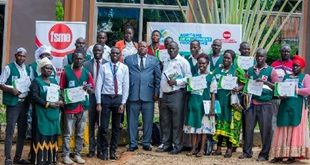
Small businesses are plagued with numerous challenges including limited financial support, inadequate entrepreneurial skills and low corporate governance
Kampala, Uganda | THE INDEPENDENT | Stanbic Bank in partnership with the GIZ Employment and Skills for Eastern Africa Programme (E4D/SOGA) will support Small and Medium Enterprises trainings ahead of oil and gas production, according to the bank’s Chief Executive Officer, Patrick Mweheire.
Mweheire, who was speaking during the graduation ceremony of 548 entrepreneurs and 122 SMEs on Aug. 09, said the Bank is committed to supporting SMEs growth and transformation of lives of various stakeholders in the sector at absolutely no cost.
“The business incubator is pleased to have GIZ’s programme on board as partners in running the SME development programme that is purposed to support and nurture SMEs in order to develop and grow by bridging the identified gaps,” he said, adding that GIZ has extended Shs400million towards the training expansion.
GIZ’s E4D/SOGA programme is jointly funded by the British, Norwegian and German governments to facilitate regional expansion of SME business trainings across the country.
The expansion will involve opening business incubation centres in Gulu to serve the northern region, Mbale to serve the eastern region, Hoima to serve the oil-rich region and Mbarara to serve the western region.
This is expected to ease the cost of travel and accommodation for the entrepreneurs and SMEs to attend trainings.
Mweheire said Stanbic alone has already spent approximately Shs4bn in running the business incubation programme.
Donald Agaba, the deputy team leader for a training programme in GIZ said the incubator has brought in the much needed business development services to Ugandan enterprises and is filling the large gap in the enterprise development landscape.
“The programme aligns with the E4D/SOGA objective of promoting local employment through capacity development of both Ugandan enterprises and people, particularly to maximise local benefits brought about by investments in the nascent oil and gas industry,” he said.
This development comes as local SMEs are plagued with numerous challenges that limit their potential including limited financial support, inadequate entrepreneurial skills, management, marketing, poor financial planning, low corporate governance and poor banking and borrowing history.
Meanwhile, Stanbic Bank awarded 548 entrepreneurs from 122 Small and Medium Enterprises with certificates having completed business training and courses at its business incubator.
This was the third cohort of businesses that the incubator has churned out since its inception in February 2018.
The graduates went through different training sessions ranging from contracting, risk and insurance, bid management, procurement and negotiation, quality management, procurement and negotiation and branding and image building.
“Statistics from the past graduates demonstrate real productivity and revenue gains made by businesses that have completed the incubator training…62% of companies showed positive growth through expansion into new markets and have taken on new employees. This demonstrates the continued growth for SMEs across the country,” Mweheire said.
He said that SMEs are the key engine of growth for Uganda’s economy with employment capacity of over 2.5 million people, significantly higher than the corporate private sector at approximately 800,000.
“You simply cannot grow Uganda without growing the SMEs which is why we established a business incubator that provides capacity development programmes for entrepreneurs in SMEs. It trains and provides them with soft and hard skills necessary to improve their business operations and compete more effectively in the market place. It also deliberately prepares them to leverage the upcoming opportunities in Uganda’s emerging oil and gas sector,” he said.
Mweheire said over the last 18 months, the incubator has run three successful cohorts and a total of 1,062 entrepreneurs from 300 SMEs have been successfully trained and graduated from the incubator.
The Petroleum Authority of Uganda Executive Director, Ernest Rubondo, said he is impressed that the trainings have been carried out prior to making the Financial Investment Decision for the oil sector.
He said the delay in finalizing FID is in away a blessing to local SMEs as it has helped the local companies to prepare themselves better to take up opportunities in the lucrative sector.
The government and the oil companies hope to pump approximately US$20bn in various infrastructure services including roads, pipeline and oil refinery ahead of oil production slated for around 2023. Uganda is estimated to have approximately 6.5bn barrels of oil.
****
 The Independent Uganda: You get the Truth we Pay the Price
The Independent Uganda: You get the Truth we Pay the Price


